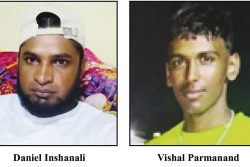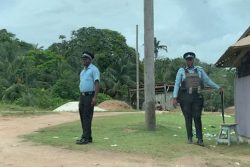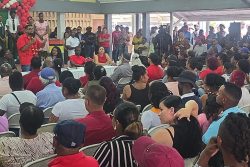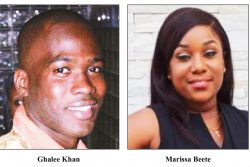By Tony Cozier
ONLY a couple of days after the administrative leaders of West Indies cricket spoke with heady optimism about the future, the team’s two Twenty20 internationals against Ireland at Sabina Park last Wednesday and Friday brought them back to the present, stark reality.
The reigning World Twenty20 champions were beaten by four wickets in the first and, after the indignity of 96 for nine in their innings, were made to scrap down to the last ball to keep the Irish to 85 for eight.
The victory, by 11 runs, did no more than assuage the humiliation. These were opponents, not even with full ICC status,

who couldn’t make it past the qualifying round in the recent regional Nagico Super50 tournament.
In the interim, the Irish remained in Trinidad and prepared for the official Sabina assignment with two matches; they were beaten in the second by the Trinidad and Tobago ‘B’ team.
It was too much for even the most ardent West Indies’ supporter to take. Patrick Rampersad, an executive member of the Trinidad and Tobago, reflected the wide consensus.
“You are the world champions and being beaten is not out of this world but being beaten by a minnow like Ireland, in your own back yard, is not acceptable,” he said. “Imagine a T&T ‘B’ team defeated this Ireland side.”
At least Rampersad took an interest. Thousands of others have long since abandoned hope.
The brief Irish interlude ends with an ODI at Sabina today. It is the West Indies’ first international series since the chaotic, concurrent tours of India and New Zealand where they endured defeat in four of the five Tests; three ended in three days, one in four.
The Irish embarrassment at Sabina was the fifth successive Twenty20 loss, following two by Pakistan in St.Vincent last year and two against New Zealand in January.
Undeterred by such irrefutable evidence, West Indies Cricket Board (WICB) president Dave Cameron and chief executive officer Michael Muirhead were both upbeat about the future at a media conference at the Trinidad Hyatt last Monday.
“As the West Indies team continues to regain strength, the WICB will be able to negotiate more for our brand, which is a most significant consideration,” Cameron said, once more reiterating the reasons why the WICB backed the contentious proposal for a takeover of the ICC’s leadership by India, England and Australia.
With the increased revenue that would result from the ICC shakeup and what he termed “a fortified development programme”, the West Indies would be “nowhere near” to No.10 in the Test rankings that would entail a demotion/promotion playoff against the top team from the associates Intercontinental Cup. A decider against Afghanistan in Kabul, perhaps?
Given recent results, the West Indies’ drop to No.10 is not as completely out of the question as Cameron makes out.
Muirhead was even more forthright than his boss in his prediction.
He was “fully confident” that the West Indies would be “in the driver’s seat…at No.1 in at least one form of the game” by the end of the current cycle of the FTP in 2020.
It is a position that would give them more power in negotiations with other ICC members.
They are presently No.8 in the ICC’s Test and ODI rankings. It would require a remarkable turnaround to fulfil the assured expectations of Cameron and Muirhead.
There certainly has been no sign of the West Indies continuing to “regain strength”; whenever they have taken one step forward over the past 20 years, it is inevitably followed by two back. Up the No.6 on the Test ladder last October, they are now back to No.8.
The WICB is pinning its hopes for a revival on the overall plan of new director of cricket, the Englishman Richard Pybus, who was appointed last November. It includes a complete review of systems, from grassroots and schools through to first-class and international cricket.
While the WICB hierarchy puts a brave face on the team’s present plight, Pybus’ is an indirect, but obvious, response to the self-evident truth, as stated by Darren Sammy following the series in New Zealand, that “we cannot continue like this”.
The Test and Twenty20 captain foresaw “tough decisions” for Ptybus and for head coach Ottis Gibson. “Some careers are on the line,” he said.
Gibson’s opposite opinion was instructive.
“We can get home, let the dust settle and assess where we are,” was his counter to Sammy’s plea for urgent action. “We can come up with a plan, but also decide who the right personnel are.”
The WICB allowed the dust to settle for five weeks before holding its debriefing last Monday with the relevant tour individuals. As it usually does, it then swept the dust under the carpet and continued with life as usual.
The selectors (the same panel that chose the identical squad for New Zealand that had been thrashed in entirely different conditions in India) predictably stuck to their tried and trusted. No one’s career was on the line.
Chris Gayle had not played a match since tearing his hamstring in India last November 21; Marlon Samuels and Sammy were sidelined by contrasting injuries after the first ODI in New Zealand on Boxing Day.
Yet all three were included for the series against Ireland; the only newcomer was fast bowler Miguel Cummins who wasn’t picked by his own Barbados selectors for the preceding Super50 tournament.
It was ill-judged complacency. The thinking, clearly, was that Ireland were of a standard that would ease Gayle, Samuels and Sammy back into action without any pressure.
It was another misjudgement. The West Indies are in no position right now to underestimate any opponent. Not even by 2020 when, according to the CEO, they’ll be No.1 and demanding top dollars for their brand.








